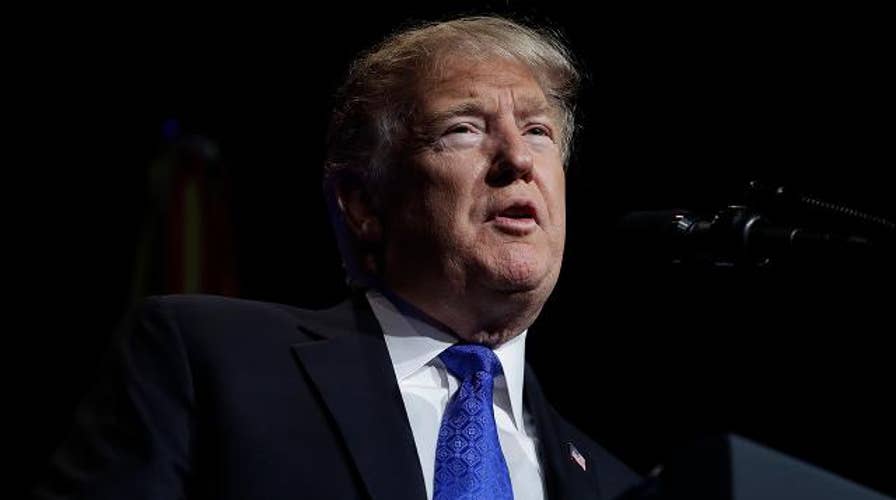Trump: It's not enough to keep pace with our adversaries, we must outpace them at every turn
President Trump participates in the Missile Defense Review announcement at the Pentagon.
Donald Trump has reached the mid-point of his presidency. How will history judge him at this point in his first term of office; bearing in mind the wisdom of Chou En Lai when Henry Kissinger asked him what he thought the impact of the 1789 French Revolution was on history, replied, “It’s too early to tell.”
The problem with journalists and media, especially today’s media, is that they magnify the sensational at the expense of the significant. The historian’s job is to do the opposite. Trump’s first two years have certainly been sensational. That’s made it hard for journalists and pundits to see what’s happening underneath.
We can say first of all there’s been no American president like him. Not Andrew Jackson, not Abraham Lincoln, not Harry Truman, who were all seen as highly unorthodox presidents and were vilified by the elite opinion of their time, can hold a candle to Trump’s breaking of every expectation of what a president is and how he should behave. No doubt Trump sees himself as a model of leadership; but it’s not leadership according to any model we’re accustomed to.
TRUMP AT PRESIDENTIAL HALFWAY MARK: WHERE HE STANDS ON CAMPAIGN PROMISES
We can also note that he has deep personal flaws. He is impatient, impulsive, self-centered, and at times irresponsible: this a serious flaw for a president who leads the world’s largest superpower and whose every off-hand remark or impulse reverberates in world capitals, whether friends or foes.
All these flaws are reflected in his tweets, which are the principal way a lazy media and commentariat have come to evaluate Trump and his presidency. They turn on their phones, read, and react. Nothing could be easier, and nothing could be more misleading. Because in the end history will judge Donald Trump not on his tweets but his deeds. And these, by and large, have reflected his undeniable virtues.
It turns out he is utterly fearless; completely indifferent to elite opinion on both the right (Wall Street Journal, Commentary, the now defunct Weekly Standard) and the left, which inflames critics to the point of obsessive hostility.
He is also undeterred by the fact that he is totally on his own, with no political party or faction behind him, not even his fellow Republicans. That gives him the freedom to act on the basis of what he sees as the best interests of the United States and the voter base who put him in office and who rally around him through thick and thin and to act on what he sees as the big issues confronting America in the 21st century. Here he has proven to be more right and farsighted than his critics, or even many of his presidential advisers.
In the end history will judge Donald Trump not on his tweets but his deeds. And these, by and large, have reflected his undeniable virtues.
He has been right about the need to reduce the power of the federal government, which means much more than just reducing federal spending—the traditional strategy of GOP deficit hawks.
It really means cutting back on the reach of what is called the administrative state, i.e. the power of unelected federal bureaucrats to decide how Americans live and what they’re allowed to do or are forced to.
These two years of Trump have seen a massive rollback of federal regulations, all taking place under the radar as the media rages about alleged Russian collusion and impeachment.
He has been right about illegal immigration. A country that can’t control its borders can’t control its destiny.
Most important, he is right about the threat from China. Viewed from the perspective of great power relations, his entire presidency has been about getting America to face the comprehensive challenge stemming from Beijing, and its strategy for displacing America as the world’s dominant superpower. In fact, it represents the most comprehensive grand strategy for confronting and defeating a competing superpower since Ronald Reagan’s grand strategy toward the Soviet Union.
CLICK HERE TO GET THE FOX NEWS APP
From revving up the economy through tax cuts; increasing military spending; conducting tariff and trade wars with Beijing that roil global markets; and trimming commitments in places like Europe and the Middle East that irritate and outrage critics; Trump has taken an all-out “we win, they lose” approach to dealing with the China challenge, very similar to the approach our fortieth president used to win the Cold War.
It’s far too early to discern whether this constitutes a Trump Doctrine, comparable to the Reagan Doctrine of the 1980s. But after two decades of self-delusion about America’s ability to get along with China, even to treat it as a strategic partner, this strategy is the key legacy that Trump will leave to his successors, Democrat or Republican. When all is said, it may even be the key to his ultimate place in American history.

